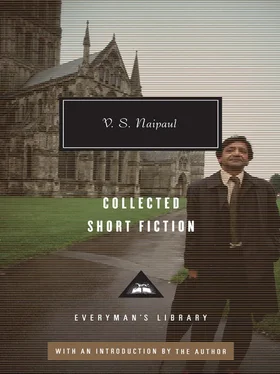I AM NOW AN American citizen and I live in Washington, capital of the world. Many people, both here and in India, will feel that I have done well. But.
I was so happy in Bombay. I was respected, I had a certain position. I worked for an important man. The highest in the land came to our bachelor chambers and enjoyed my food and showered compliments on me. I also had my friends. We met in the evenings on the pavement below the gallery of our chambers. Some of us, like the tailor’s bearer and myself, were domestics who lived in the street. The others were people who came to that bit of pavement to sleep. Respectable people; we didn’t encourage riff-raff.
In the evenings it was cool. There were few passers-by and, apart from an occasional double-decker bus or taxi, little traffic. The pavement was swept and sprinkled, bedding brought out from daytime hiding-places, little oil-lamps lit. While the folk upstairs chattered and laughed, on the pavement we read newspapers, played cards, told stories and smoked. The clay pipe passed from friend to friend; we became drowsy. Except of course during the monsoon, I preferred to sleep on the pavement with my friends, although in our chambers a whole cupboard below the staircase was reserved for my personal use.
It was good after a healthy night in the open to rise before the sun and before the sweepers came. Sometimes I saw the street lights go off. Bedding was rolled up; no one spoke much; and soon my friends were hurrying in silent competition to secluded lanes and alleys and open lots to relieve themselves. I was spared this competition; in our chambers I had facilities.
Afterwards for half an hour or so I was free simply to stroll. I liked walking beside the Arabian Sea, waiting for the sun to come up. Then the city and the ocean gleamed like gold. Alas for those morning walks, that sudden ocean dazzle, the moist salt breeze on my face, the flap of my shirt, that first cup of hot sweet tea from a stall, the taste of the first leaf-cigarette.
Observe the workings of fate. The respect and security I enjoyed were due to the importance of my employer. It was this very importance which now all at once destroyed the pattern of my life.
My employer was seconded by his firm to Government service and was posted to Washington. I was happy for his sake but frightened for mine. He was to be away for some years and there was nobody in Bombay he could second me to. Soon, therefore, I was to be out of a job and out of the chambers. For many years I had considered my life as settled. I had served my apprenticeship, known my hard times. I didn’t feel I could start again. I despaired. Was there a job for me in Bombay? I saw myself having to return to my village in the hills, to my wife and children there, not just for a holiday but for good. I saw myself again becoming a porter during the tourist season, racing after the buses as they arrived at the station and shouting with forty or fifty others for luggage. Indian luggage, not this lightweight American stuff! Heavy metal trunks!
I could have cried. It was no longer the sort of life for which I was fitted. I had grown soft in Bombay and I was no longer young. I had acquired possessions, I was used to the privacy of my cupboard. I had become a city man, used to certain comforts.
My employer said, ‘Washington is not Bombay! Santosh. Washington is expensive. Even if I was able to raise your fare, you wouldn’t be able to live over there in anything like your present style.’
But to be barefoot in the hills, after Bombay! The shock, the disgrace! I couldn’t face my friends. I stopped sleeping on the pavement and spent as much of my free time as possible in my cupboard among my possessions, as among things which were soon to be taken from me.
My employer said, ‘Santosh, my heart bleeds for you.’
I said, ‘Sahib, if I look a little concerned it is only because I worry about you. You have always been fussy, and I don’t see how you will manage in Washington.’
‘It won’t be easy. But it’s the principle. Does the representative of a poor country like ours travel about with his cook? Will that create a good impression?’
‘You will always do what is right, sahib.’
He went silent.
After some days he said, ‘There’s not only the expense, Santosh. There’s the question of foreign exchange. Our rupee isn’t what it was.’
‘I understand, sahib. Duty is duty.’
A fortnight later, when I had almost given up hope, he said, ‘Santosh, I have consulted Government. You will accompany me. Government has sanctioned, will arrange accommodation. But not expenses. You will get your passport and your P form. But I want you to think, Santosh. Washington is not Bombay.’
I went down to the pavement that night with my bedding.
I said, blowing down my shirt, ‘Bombay gets hotter and hotter.’
‘Do you know what you are doing?’ the tailor’s bearer said. ‘Will the Americans smoke with you? Will they sit and talk with you in the evenings? Will they hold you by the hand and walk with you beside the ocean?’
It pleased me that he was jealous. My last days in Bombay were very happy.
I packed my employer’s two suitcases and bundled up my own belongings in lengths of old cotton. At the airport they made a fuss about my bundles. They said they couldn’t accept them as luggage for the hold because they didn’t like the responsibility. So when the time came I had to climb up to the aircraft with all my bundles. The girl at the top, who was smiling at everybody else, stopped smiling when she saw me. She made me go right to the back of the plane, far from my employer. Most of the seats there were empty, though, and I was able to spread my bundles around and, well, it was comfortable.
It was bright and hot outside, cool inside. The plane started, rose up in the air, and Bombay and the ocean tilted this way and that. It was very nice. When we settled down I looked around for people like myself, but I could see no one among the Indians or the foreigners who looked like a domestic. Worse, they were all dressed as though they were going to a wedding and, brother, I soon saw it wasn’t they who were conspicuous. I was in my ordinary Bombay clothes, the loose long-tailed shirt, the wide-waisted pants held up with a piece of string. Perfectly respectable domestic’s wear, neither dirty nor clean, and in Bombay no one would have looked. But now on the plane I felt heads turning whenever I stood up.
I was anxious. I slipped off my shoes, tight even without the laces, and drew my feet up. That made me feel better. I made myself a little betel-nut mixture and that made me feel better still. Half the pleasure of betel, though, is the spitting; and it was only when I had worked up a good mouthful that I saw I had a problem. The airline girl saw too. That girl didn’t like me at all. She spoke roughly to me. My mouth was full, my cheeks were bursting, and I couldn’t say anything. I could only look at her. She went and called a man in uniform and he came and stood over me. I put my shoes back on and swallowed the betel juice. It made me feel quite ill.
The girl and the man, the two of them, pushed a little trolley of drinks down the aisle. The girl didn’t look at me but the man said, ‘You want a drink, chum?’ He wasn’t a bad fellow. I pointed at random to a bottle. It was a kind of soda drink, nice and sharp at first but then not so nice. I was worrying about it when the girl said, ‘Five shillings sterling or sixty cents US.’ That took me by surprise. I had no money, only a few rupees. The girl stamped, and I thought she was going to hit me with her pad when I stood up to show her who my employer was.
Presently my employer came down the aisle. He didn’t look very well. He said, without stopping, ‘Champagne, Santosh? Already we are overdoing?’ He went on to the lavatory. When he passed back he said, ‘Foreign exchange, Santosh! Foreign exchange!’ That was all. Poor fellow, he was suffering too.
Читать дальше









